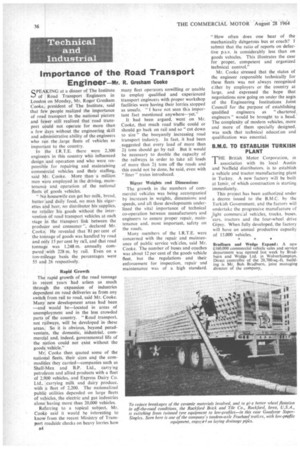portance of the Road Transport Engineer-Mr.
Page 38

If you've noticed an error in this article please click here to report it so we can fix it.
R. Gresham Cooke
SPE KING at a dinner of The Institute of Road Transport • Engineers in Lund on Monday, Mr. Roger Gresham Cooke, president of The Institute, said that fe people realized the importance of ma transport in the national picture and fe er still realized that road transport c uld not operate for more than a few says without the engineering skill and ad inistrative ability of the engineers who r n the ,large fleets of vehicles so import nt to the country.
In he I.R TX. there were 2,300 engine rs in this country who influenced design and opeiation and who were responsib e for repairing and maintaining comm rcial vehicles and their staffing, said r. Cooke. More than a million men w re employed in the driving, maintenanc and operation of the national fleets f goods vehicles.
"Ni housewife can get her milk, bread, butter and daily food, no man his cigarettes a d beer, no distributor his supplies, no ret iler his goods without the interventio of road transport vehicles at each stage n the transport link between the produ er and consumer declared Mr. Cooke He revealed that 81 per cent of the to nage of goods was handled by road and o ly 15 per cent by rail, and that road tonna e was 1,248 m. annually compared with 228 m. by rail. Even on a ton-m leage basis the percentages were 55 an 26 respectively.
Rapid Growth Th rapid growth of the road tonnage in re ent years had arisen as much throu the expansion of industries depen ent on road deliveries as from any swit from rail to road, said Mr. Cooke. Many new development areas had been —and would be—located in areas of unem loyment and in the less crowded parts of the country. "Road transport. not r ilways. will be developed in these areas. So it is obvious, beyond peradventu e, the domestic, industrial, commerci 1 and, indeed, governmental life of the lion could not exist without the good vehicle."
Mr Cooke then quoted some of the natio al fleets, their sizes and the commodi 'es they carried—companies such as Shell ex and B.P. Ltd., carrytng petro eum and allied products with a fleet of 2, vehicles. and Express Dairy Co. Ltd., carrying milk and dairy produce, with fleet of 2,200. The nationalized publi utilities depended on large fleets of ye ides, the electric and gas industries alone having more than 20,000 vehicles.
Re erring to a topical subject, Mr.
Co said it would he interesting to kno from the recent Ministry of Transport roadside checks on heavy lorries how many fleet operators unwilling or unable to employ qualified and experienced transport engineers with proper workshop facilities were having their lorries stopped as unsafe. " I have not seen th:s important fact mentioned anywhere—yet."
It had been argued, went on Mr. Cooke, that much road traffic could or should go back on rail and so "cut down to size" the buoyantly increasing road transport industry. In fact, it had been suggested that every load of more than 21 tons should go by rail But it would be necessary to double the capacity of the railways in order to take all loads of more than 2+ tons off the roads and this could not be done, he said, even with "liner" trains introduced.
Bigger Weights and Dimensions The growth in the numbers of commercial vehIcles was being accompanied' by increases in weights, dimensions and speeds, and all these developments underlined the vital importance of technical co-operation between manufacturers and engineers to ensure proper repair, maintenance and, most important, safety on the roads.
Many members of the I.R.T.E. were concerned with the repair and maintenance of public service vehrcles, said Mr. Cooke. The number of buses and coaches was about 12 per cent of the goods vehicle fleet, but the regulations and their enforcement for inspection, repair and maintenance was of a high standard. "How often does one hear of the mechanically dangerous bus or coach? I submit that the ratio of reports on defective p.s.v. is considerably less than on goods vehicles. This illustrates the case for proper, competent and organized technical control."
Mr. Cooke stressed that the status of the engineer responsible technically for these fleets was not always recognized ether by employers or the country at large, and expressed the hope that negotiations now going on under the aegis of the Engineering Institutions Joint Council for the purpose of establishing qualified engineers as "chartered engineers" would be brought to a head. The complexity of modern vehicles, more and more of them specially designed, was such that technical educat:on and qualification was essential.
B.M.C. TO ESTABLISH TURKISH PLANT
THE British Motor Corporation, in association with its focal Austin and Nuffield distributors, is to establish
a vehicle and tractor manufacturing plant in Turkey. A new factory will be built at Izmir, of which construction is starting immediately.
This project has been authorized under a decree issued to the B.M.C. by the Turkish Government, and the factory will undertake the progressive manufacture of commerc:al vehicles, trucks, buses. cars, tractors and the four-wheel drive Gipsy. When fully developed, the factory will have an annual productive capacity of 13.000 vehicles.
Bradbarn and Wedge Expand : A new £.160,000 commercial vehicle sales and service department was opened last week by Bradburn and Wedge Ltd. in Wolverhampton. Direct controller of the 20,700-sq.-ft. building is Mr. Bob Bradburn, joint managing director of the company.




















































































































